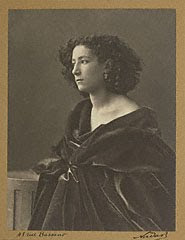1. A group of secret and often scheming advisers, as of a king; a cabal or clique.
Origin: Camarilla comes from Spanish, literally, "a small room," from Late Latin camera, "chamber" ("vault; arched roof" in Latin), from Greek kamara, "vault."
Quote: "Mr Kiselev likened Yeltsin's entourage to a "camarilla" . . . which would turn Russia "into a gigantic banana republic corrupted from top to bottom by a rotten clique of demagogues". -- Marcus Warren, "Moguls at war over control of Kremlin", Daily Telegraph, July 23, 1999
HISTORY
Recipe for and photos of Nesselrode Pudding... "Flavored with chestnuts and maraschino, Nesselrode pudding was a Victorian favorite."

^^ CARLSBAD was/is a spa in Bohemia (current Czechoslovakia)- During the Siege of Paris in 1871, the northern German states, supported by its German allies from outside of the confederation (excluding Austria), formed the GERMAN EMPIRE with the proclamation of the Prussian king WILHELM I of Prussia as German Emperor in the Hall of Mirrors at the Palace of Versailles (note: he was the grandson of Queen Victoria of England!).
- The French term Entente-Cordiale ("cordial agreement") (amities?) was first used in English in 1844 (OED) to denote recognition of common interests between the United Kingdom & France. When used today, it almost always denotes the 2nd Entente-Cordiale, the written and partly secret agreement signed in London between the two powers on 8 April 1904.
- The Franco-Russian Alliance was a military alliance between the French Third Republic and the Russian Empire that ran from 1892 to 1917. The alliance ended the diplomatic isolation of France and undermined the supremacy of the German Empire in Europe.
- More on FRANCE in the 19th CENTURY
~~~~~~~~~~
“What do I see? A Nesselrode pudding! As well! I declare, I shall need a course at Carlsbad after such a Lucullus-feast as this."Recipe for and photos of Nesselrode Pudding... "Flavored with chestnuts and maraschino, Nesselrode pudding was a Victorian favorite."

Lucullan [loo-kuhl-uhn] –adjective
1.(esp. of banquets, parties, etc.) marked by lavishness and richness; sumptuous.
2. of or pertaining to Lucullus or his life style. Also, Lu·cul·le·an [loo-kuh-lee-uhn] Lu·cul·li·an. Origin: 1855–60; < L Lucullanus; see Lucullus
"Lucullan." Dictionary.com Unabridged. Random House, Inc. 08 Jul. 2010.
demi-monde - Marges de la bonne société, mais fréquentées par celle-ci. (En particulier) Milieu constitué autour de femmes légères, souvent vénales ou entretenues par les hommes du monde fr.wiktionary.org/wiki/demi-monde
Demi-mondaine was a polite 19th century term that was often used the same way we use the term "mistress" today. Demi-monde primarily referred to a class of women on the fringes of respectable society supported by wealthy lovers (usually each had several)... en.wikipedia.org/wiki/Demimonde








